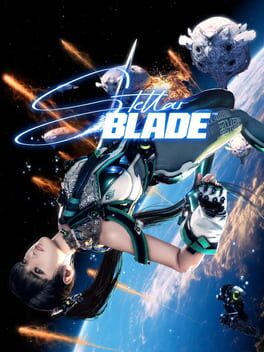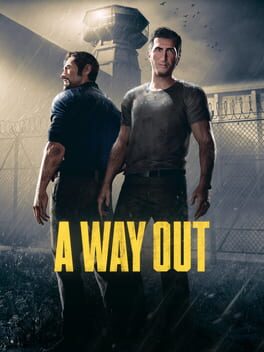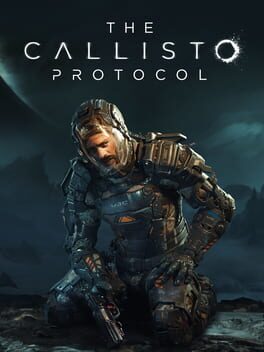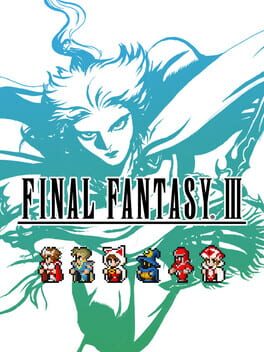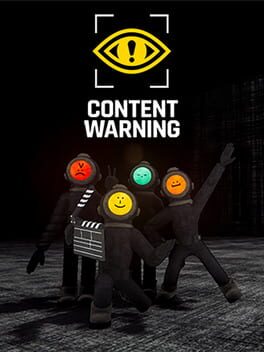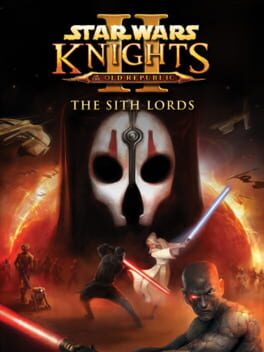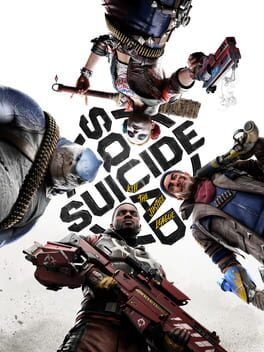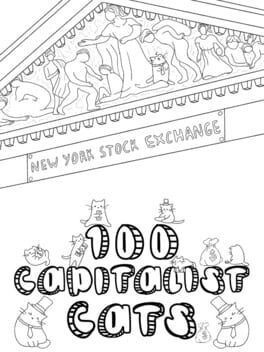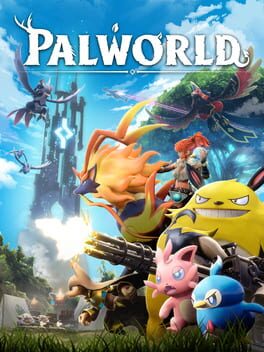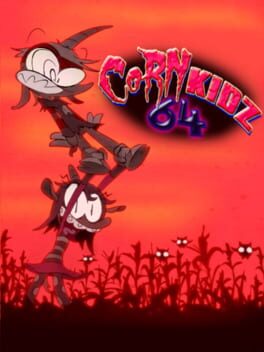HazeRedux
2018
This is one of those games that I really want to like. I’ve tried nearly a dozen times to get it to “click” and it never does.
I always bounce off of it and I’ve never entirely understand why.
Sure, the platforming is precision machined but maybe the fact that the game is too forgiving with its checkpoints leads to a lack of stakes or tension for someone like me that isn’t going to go for every strawberry.
I also think the levels might be too long and that the game forces you to spend too much time in individual biomes.
The story’s presentation, at least early on, may also be a bit too sappy and not engaging.
Idk. I know people really love this game and what I’ve played of it is fine. But it’s lacking something crucial.
Good OST, though.
I always bounce off of it and I’ve never entirely understand why.
Sure, the platforming is precision machined but maybe the fact that the game is too forgiving with its checkpoints leads to a lack of stakes or tension for someone like me that isn’t going to go for every strawberry.
I also think the levels might be too long and that the game forces you to spend too much time in individual biomes.
The story’s presentation, at least early on, may also be a bit too sappy and not engaging.
Idk. I know people really love this game and what I’ve played of it is fine. But it’s lacking something crucial.
Good OST, though.
2024
Oh man, where do I even begin with this game? I'll preface by saying that Final Fantasy VII Remake is one of my favorite games in the series. It was a title that understood how to create a humanist experience that genuinely makes you care about its world and inhabitants with excellent narrative, character writing, and world-building through its side quests.
It was also a tight and focused experience that culminated in an ending so staggeringly ambitious that I still think about it often.
So, it's no surprise that I was looking forward to the follow-up, especially since it has most of the same cooks behind the sauce of Remake.
However, after finally finishing Rebirth after what seems like an eternity, I'm left confused and ambivalent.
The big red flag for me was when, during an interview, one of the game's directors highlighted the Horizon as an inspiration for the game's approach to open-world design.
Man, they weren't lying.
Rebirth begins with a linear, story-focused segment that lasts a few hours before thrusting you into one of the most insufferably prescriptive open-worlds I've ever played in a video game.
You spend around 15-20 hours doing the most fucking pea-brained busywork imaginable for Chadley, who has to berate and interrupt your progression at every possible moment. It's built upon the most mind-numbing tasks imaginable such as "activate tower," "kill a group of enemies," and "interact with a McGuffin and play a minigame where you either play Simon Says for morons or time a button press."
The world is absolutely bursting with these menial activities, and they take a fucking Mossberg to the game's narrative pacing. I shit you not: there was a good 15-hour block of this game's early hours where not a single piece of narrative occurred.
Maybe this would have been easier to stomach if the characters had interacted when navigating the open-world, but they aren't even there outside of an occasional comment. This issue is especially true for characters that are outside your active party. I legitimately forgot some of them existed even though they added the "backline" into the game's combat system, where non-active characters still stand at the edge of a combat encounter doing what I assume to be chip damage.
When I finally completed my Chadley Chores, I progressed to one of the game's more linear segments where some goddamn plot finally happened and was reminded of why I was still playing this in the first place. In these segments, characters feel alive with interactions heightened by curated moments, a complete 180 from the dozen or so hours prior.
However, it wasn't too long before I was shoved into another open-world area filled with the most boring fucking slop imaginable. I know the original Final Fantasy VII had a decent chunk of minigames, but Rebirth takes this to an unimaginable extreme.
It feels like there is a new minigame around every corner, and these things range in quality from pretty fun to complete dogshit. And look, I can appreciate a shitty minigame here and there if there is some rhyme or reason to its existence. I liked playing frisbee with the dog in Gravity Rush 2. I may as well be a shitty minigame connoisseur, for fuck's sake.
I think the biggest issue is that there is just too fucking much. Full stop. Too much side content. Too many fucking minigames. This game is just the most padded fucking experience I have ever had, and most of the content fucking sucks ass.
I usually try to keep a flow of thought in my writing, but I don't know where to put this, so it's going here. Let me tell you about this motherfucker Chadley. I've never hated a character in a video game as much as I do Chadley. Not only is he an intolerable, passive-aggressive, and holier-than-thou little Young Sheldon ripoff, but his mere existence is a manifestation of all my problems with the game. He's going to pop up on your stupid ass little cellphone, stop you in your tracks, and mansplain the most basic shit ever to you like you've never played a fucking video game before.
I honestly think I would rather individually pluck each one of my ass hairs out with tweezers than have to listen to Chadley flap his fucking gums at me. Sometimes, I think the developers are aware of how bad he is. For instance, during one of the game's better moments, the Queens Blade tournament, Chadley becomes one of the later opponents. After taking the fattest fucking dump on him—I'm talking like shutting him out and dropping 120+ on him and giving me an overwhelming feeling of catharsis—I spoke to a couple of other people about it. They all managed to crush him similarly, which makes me think the balancing is tilted heavily in your favor for the Chadley battle, which kind of rules.
If you have enough brain rot to still be reading my semi-coherent rambling about this game, you're probably asking yourself, "Man, why the hell is this dipshit still playing a game he clearly hates?"
That's because interspersed throughout all of this dogshit are genuine moments of excellence. Everyone is going to mention how good the Bow Wow sidequest—where you escort a dog accompanied by an insanely catchy song while Barret lets his emotional walls down to vent about how worried he is about Marlene's future and his role as her father—is and they should because it's fantastic.
These are things that Remake had consistently and in spades, and it's a testament to how great this cast of characters is and how great the writing can be when the bloat doesn't get in its way.
By the time I had completed all of the open-world monotony—like 100 hours into the game, lol—I could finally enjoy something close to my experience with Remake. I could approach sidequests that were still good despite rarely reaching the highs of the previous game without worrying about the mundane busy work.
But even then, this game just can't fucking help itself. After hours of Protorelic quests that teased Gilgamesh, ranging in quality from excellent to alright, I thought I was finally about to confront the goofy wandering swordsman. Lol, fat chance; enjoy four boss fights of insane difficulty that require you to grind levels because you are too weak. Get fucked nerd.
I won't say much about the combat because it's as excellent as Remake's. However, this time, there is more focus on encounters as puzzles with specific solutions, which I enjoy but don't necessarily prefer. But it's still an often frantic and satisfying mix of ATB and real-time combat that rewards strategic party composition and setups. I ended up settling on Cloud, Tifa, and Cait Sith as my main party because they could max out the stagger modifier and crit chance, resulting in jolting amounts of damage.
The last two chapters of the game did solidify the reason I persisted through this bipolar experience. Once you reach the game's point of no return, you're treated to about four to five hours of pure joy, and the game ends on an incredibly high note that brings out the best in its cast and writing.
There’s plenty of fantastic stuff in this game, you just have to climb a mountain of shit to get to it.
For the first time in my life, I genuinely don't know how I feel about a game. I beat this last week, and I've been thinking about it with mixed emotions since then. It's one of the most maddeningly polarizing pieces of media I've ever experienced, and I can't tell you if it's bad or good.
I can’t even give this thing a score because I literally do not know how to quantify my opinion of this game.
I usually do some pretty heavy editing to my in-depth assessments of games that I've played, cutting out plenty of sections that don't fit, but I'm just going to say fuck it and post this just like Square Enix did when they released this shit.
Have some fucking self-control for the next game. Either way, I’m only playing that shit if you let me crucify Chadley.
Also, if you made it this far, check yourself into a psyche ward because you're just as insane as I am for finishing this game.
It was also a tight and focused experience that culminated in an ending so staggeringly ambitious that I still think about it often.
So, it's no surprise that I was looking forward to the follow-up, especially since it has most of the same cooks behind the sauce of Remake.
However, after finally finishing Rebirth after what seems like an eternity, I'm left confused and ambivalent.
The big red flag for me was when, during an interview, one of the game's directors highlighted the Horizon as an inspiration for the game's approach to open-world design.
Man, they weren't lying.
Rebirth begins with a linear, story-focused segment that lasts a few hours before thrusting you into one of the most insufferably prescriptive open-worlds I've ever played in a video game.
You spend around 15-20 hours doing the most fucking pea-brained busywork imaginable for Chadley, who has to berate and interrupt your progression at every possible moment. It's built upon the most mind-numbing tasks imaginable such as "activate tower," "kill a group of enemies," and "interact with a McGuffin and play a minigame where you either play Simon Says for morons or time a button press."
The world is absolutely bursting with these menial activities, and they take a fucking Mossberg to the game's narrative pacing. I shit you not: there was a good 15-hour block of this game's early hours where not a single piece of narrative occurred.
Maybe this would have been easier to stomach if the characters had interacted when navigating the open-world, but they aren't even there outside of an occasional comment. This issue is especially true for characters that are outside your active party. I legitimately forgot some of them existed even though they added the "backline" into the game's combat system, where non-active characters still stand at the edge of a combat encounter doing what I assume to be chip damage.
When I finally completed my Chadley Chores, I progressed to one of the game's more linear segments where some goddamn plot finally happened and was reminded of why I was still playing this in the first place. In these segments, characters feel alive with interactions heightened by curated moments, a complete 180 from the dozen or so hours prior.
However, it wasn't too long before I was shoved into another open-world area filled with the most boring fucking slop imaginable. I know the original Final Fantasy VII had a decent chunk of minigames, but Rebirth takes this to an unimaginable extreme.
It feels like there is a new minigame around every corner, and these things range in quality from pretty fun to complete dogshit. And look, I can appreciate a shitty minigame here and there if there is some rhyme or reason to its existence. I liked playing frisbee with the dog in Gravity Rush 2. I may as well be a shitty minigame connoisseur, for fuck's sake.
I think the biggest issue is that there is just too fucking much. Full stop. Too much side content. Too many fucking minigames. This game is just the most padded fucking experience I have ever had, and most of the content fucking sucks ass.
I usually try to keep a flow of thought in my writing, but I don't know where to put this, so it's going here. Let me tell you about this motherfucker Chadley. I've never hated a character in a video game as much as I do Chadley. Not only is he an intolerable, passive-aggressive, and holier-than-thou little Young Sheldon ripoff, but his mere existence is a manifestation of all my problems with the game. He's going to pop up on your stupid ass little cellphone, stop you in your tracks, and mansplain the most basic shit ever to you like you've never played a fucking video game before.
I honestly think I would rather individually pluck each one of my ass hairs out with tweezers than have to listen to Chadley flap his fucking gums at me. Sometimes, I think the developers are aware of how bad he is. For instance, during one of the game's better moments, the Queens Blade tournament, Chadley becomes one of the later opponents. After taking the fattest fucking dump on him—I'm talking like shutting him out and dropping 120+ on him and giving me an overwhelming feeling of catharsis—I spoke to a couple of other people about it. They all managed to crush him similarly, which makes me think the balancing is tilted heavily in your favor for the Chadley battle, which kind of rules.
If you have enough brain rot to still be reading my semi-coherent rambling about this game, you're probably asking yourself, "Man, why the hell is this dipshit still playing a game he clearly hates?"
That's because interspersed throughout all of this dogshit are genuine moments of excellence. Everyone is going to mention how good the Bow Wow sidequest—where you escort a dog accompanied by an insanely catchy song while Barret lets his emotional walls down to vent about how worried he is about Marlene's future and his role as her father—is and they should because it's fantastic.
These are things that Remake had consistently and in spades, and it's a testament to how great this cast of characters is and how great the writing can be when the bloat doesn't get in its way.
By the time I had completed all of the open-world monotony—like 100 hours into the game, lol—I could finally enjoy something close to my experience with Remake. I could approach sidequests that were still good despite rarely reaching the highs of the previous game without worrying about the mundane busy work.
But even then, this game just can't fucking help itself. After hours of Protorelic quests that teased Gilgamesh, ranging in quality from excellent to alright, I thought I was finally about to confront the goofy wandering swordsman. Lol, fat chance; enjoy four boss fights of insane difficulty that require you to grind levels because you are too weak. Get fucked nerd.
I won't say much about the combat because it's as excellent as Remake's. However, this time, there is more focus on encounters as puzzles with specific solutions, which I enjoy but don't necessarily prefer. But it's still an often frantic and satisfying mix of ATB and real-time combat that rewards strategic party composition and setups. I ended up settling on Cloud, Tifa, and Cait Sith as my main party because they could max out the stagger modifier and crit chance, resulting in jolting amounts of damage.
The last two chapters of the game did solidify the reason I persisted through this bipolar experience. Once you reach the game's point of no return, you're treated to about four to five hours of pure joy, and the game ends on an incredibly high note that brings out the best in its cast and writing.
There’s plenty of fantastic stuff in this game, you just have to climb a mountain of shit to get to it.
For the first time in my life, I genuinely don't know how I feel about a game. I beat this last week, and I've been thinking about it with mixed emotions since then. It's one of the most maddeningly polarizing pieces of media I've ever experienced, and I can't tell you if it's bad or good.
I can’t even give this thing a score because I literally do not know how to quantify my opinion of this game.
I usually do some pretty heavy editing to my in-depth assessments of games that I've played, cutting out plenty of sections that don't fit, but I'm just going to say fuck it and post this just like Square Enix did when they released this shit.
Have some fucking self-control for the next game. Either way, I’m only playing that shit if you let me crucify Chadley.
Also, if you made it this far, check yourself into a psyche ward because you're just as insane as I am for finishing this game.
2018
I knew this was a good game when I drew a mustache on that one family’s portrait in the farmhouse, and in response, my friend erased it. This action created a tug of war, which resulted in me adding and him erasing the mustache repeatedly throughout the course of the level.
That was until finally, I trapped him in the middle of a co-op platforming puzzle and made him watch as I slowly walked back to the portrait to draw the mustache on before returning to finish the co-op puzzle, causing the level to end and emerging from the mustache war victorious as he wallowed in a pool of agonizing defeat.
I also got to beat his ass at connect four and fucking kill him at the end of the game.
That was until finally, I trapped him in the middle of a co-op platforming puzzle and made him watch as I slowly walked back to the portrait to draw the mustache on before returning to finish the co-op puzzle, causing the level to end and emerging from the mustache war victorious as he wallowed in a pool of agonizing defeat.
I also got to beat his ass at connect four and fucking kill him at the end of the game.
2021
2024
2001
This review contains spoilers
For half a decade, I resisted diving into Red Dead Redemption 2, troubled by the circumstances surrounding its genesis. Learning about the reports of labor exploitation and crunch leading up to its release left me deeply disheartened by the working conditions endured by its developers.
Despite my lingering reservations, I eventually found myself pulled towards the game during a lull in recent releases. Now, having finally immersed myself in Red Dead Redemption 2, I'm grateful for the experience as it is one of the medium’s crowning achievements and a grand, maximalist work of art with one of the most fully realized worlds and some of the best character writing the medium has to offer.
While much has been said about Red Dead Redemption 2's expansive world and its protagonist, Arthur Morgan, I deliberately distanced myself from discussions about the game, allowing my experience to remain fresh.
Describing the world of Red Dead Redemption 2 as "alive" might seem cliche, but it truly embodies a sense of authenticity rarely achieved in open-world games. The world feels genuinely inhabited and organic, surpassing the typical interactive environments found in most games.
This authenticity is the result of numerous intricately woven elements. From the ambient soundtrack and immersive sound effects to the dynamic interactions between characters, coupled with captivating locations and meticulously crafted topography, every aspect harmonizes to create an unparalleled level of immersion.
Simply navigating this game’s environments was a delightful sensory experience. What's more, the world often responds to the player in subtle yet meaningful ways.
In one instance early in the game, I encountered a man in distress, crying out for help after being bitten by a snake. Offering him a health tonic saved his life and earned me his gratitude.
Hours later, while wandering through Valentine, I unexpectedly crossed paths with him again outside the gunsmith's shop. He thanked me for my earlier assistance and generously offered to cover a purchase at the shop.
This encounter was just one of numerous instances where the game acknowledged my actions and later rewarded me with interactions that reflected them, further enhancing the authenticity and believability of its world.
In that sense, it’s one of the least “videogamey” video games I have ever played. Rarely do things in the open world feel prescribed or like you’re tackling checklists, even when you are, such as when you’re hunting one of the game's dozen or so legendary animals or legendary fish.
Some may malign the microsystems in the game that lend a light simulation feel, such as the need to sleep, cook, and eat food. But they all tie back to how you engage with this world.
All of this starkly contrasts the game’s biggest flaw, its mission design. I understand that Rockstar wants to create these bombastic, cinematic, setpiece-driven missions for the player to experience. However, they are seemingly terrified of the player missing out on the carefully choreographed moments. The result is often a frustratingly restrictive mission design that penalizes even slight deviations from the intended experience.
Despite its unnecessarily rigid structure, the mission captivates players with its cinematic presentation, drawing them into the heart of the action.
One example of this is near the end of the game, where I was escorting John Marston during an ambush. Some enemies popped up atop a nearby hill, and I wanted to charge into them with my shotgun to make their little Pinkerton heads explode like overcooked pizza rolls.
Then came the frustration of encountering a fail state that seemed entirely unjustified. The game abruptly informed me that John had perished because I had strayed too far from him, even though I was just a mere 15 feet away.
Another exasperating moment occurred during a covert infiltration of an Army fort alongside Charles. The game instructed me to eliminate soldiers using a bow and arrow silently, but I opted to employ my tomahawk for stealth takedowns instead. Yet, when I approached a lone soldier facing away from me and dispatched him, the game unexpectedly triggered a fail state, citing my supposed detection.
These examples may sound trivial and arbitrary–because they are– but they highlight a significant flaw in the game's design. While many missions and setpieces are undeniably captivating, the underlying structure is marred by these inexplicable constraints, undermining the sense of freedom that the open world otherwise offers to players.
So, if half of the game is so compromised, why am I giving this five stars? Because Red Dead Redemption 2’s biggest triumph is its thought-provoking narrative and incredible character writing.
Red Dead Redemption 2 is ultimately about the death of the yeoman fantasy at the hands of Manifest Destiny and a crumbling way of life for the characters within this world. These are not “good people” in the traditional sense because they rob and kill to make ends meet. They are outlaws in the truest sense of the word, even if–most–Van Der Linde gang members have a sense of honor.
However, as the American state becomes increasingly powerful at the behest of the advancement of capitalism as the dominant economic system, the walls begin to close around them.
The Van Der Linde gang's evolution is stark; initially targeting outlaws, they shift focus to anyone capable of providing the necessary resources for survival. Dutch, the gang's leader, assumes the role of a paternal figure for many, having rescued them from dire circumstances. He wields his revered authority to shield his chosen family, yet his desperation to evade their looming fate intensifies as the game progresses.
In this changing world, there's no place left for the likes of the Van Der Linde gang. Their options narrow to either conforming to the relentless march of the progressing American state or facing annihilation by it. Consequently, Dutch repeatedly seeks one last job, a final endeavor to secure the gang's escape to distant, almost mythical lands like Tahiti.
Arthur painfully recognizes the gang's plummeting prospects and Dutch's unraveling sanity. With each passing moment, Dutch's decisions grow more reckless, leading the gang on a destructive path as they hop from one place to another, endlessly chasing the elusive promise of "one last job” and leaving chaos in their wake.
Yet Arthur and the others continue to follow Dutch, despite their better judgment, because they all love and feel indebted to him even if they know Dutch is likely and unknowingly leading them all to their demise.
The game also astutely observes that the new order replacing the era of outlaws may be even more rotten and corrupt. Under a regime fueled by unchecked capitalism and rampant labor exploitation, the scant remnants of freedom vanish, leaving individuals ensnared in a system that prioritizes profit over human dignity.
Arthur Morgan may well be one of this medium's most nuanced, endearing, and fascinating characters. I was initially drawn in by his rugged cowboy charisma, but over the course of the game, I found myself deeply attached to this mountain of a man.
The game excels in forging a deep connection with Arthur, immersing players in his internal struggles through poignant monologues and meaningful actions. Few games achieve such a profound insight into the protagonist's psyche as this one does with Arthur Morgan.
From the outset, Arthur grapples with inner turmoil, questioning the trajectory of his life, the morality of his deeds, and his purpose in the world.
It's evident that Arthur carries the burden of his past atrocities, which increasingly gnaw at him as he ages. There is a good man within Arthur, but he’s committed grim acts to persist on a path that feels more like destiny than choice. One poignant example is his relationship with Mary, his love interest, whose presence in various side quests underscores the impossibility for Arthur to break free from his tumultuous past and embrace a semblance of normalcy.
Although the game features a morality system ranging from dishonorable to honorable, portraying Arthur as dishonorable feels at odds with the narrative's portrayal of him in a chivalrous light despite his morally ambiguous actions, such as shaking down poor farmers for debt repayment.
As Arthur struggles with this internal dichotomy, he often pushes it to the back of his mind, focusing solely on the day-to-day struggle for survival. However, everything changes later in the game when he receives a devastating diagnosis: an illness that will inevitably lead to his demise: tuberculosis.
Arthur is then compelled to confront the morality of his past actions and their impact on others in the face of his own mortality. Many of the side quests from earlier chapters climax during this period, with Arthur opting to forego the harmful deeds he once would have committed to ease the burdens of those around him.
A poignant example of this transformation is his interaction with Mrs. Downes, a farmer's widow from whom Arthur extorted money earlier in the game. Mrs. Downes succumbs to the same illness that afflicts Arthur, and their encounter serves as a turning point for him. Witnessing her desperate situation, Arthur is overcome with guilt and decides to provide her and her son enough money to escape their hardships. He refrains from seeking forgiveness, feeling unworthy of it.
Although Arthur uses his diagnosis and finite time to help others, he still feels unworthy of redemption.
This marks a significant shift in Arthur's journey towards redemption. No longer able to justify his past actions, he strives to pursue a more righteous path, even if it means going against his former duties as an enforcer for the gang.
Arthur's resolve to help John, who has a family to care for, symbolizes his commitment to breaking free from the gang's destructive cycle once and for all. By this stage, Arthur's disillusionment with Dutch has peaked, and unquestioning loyalty has been replaced by a clear-eyed recognition of Dutch's reckless and senseless actions.
The tipping point comes when Dutch manipulates a group of Lakota natives into a futile diversion, sparking a needless conflict with the US Army, and publicly executes an oil baron without remorse. These actions further cement Arthur's conviction to sever ties with Dutch and his misguided leadership.
Despite being aware of his inevitable demise, Arthur sees John as a beacon of hope, someone with a future worth fighting for. His terminal diagnosis now brings him a sense of clarity and purpose. Unlike those who are uncertain about their fate, Arthur views his impending death as a gift—a catalyst for self-reflection and embarking on a new, righteous path.
Arthur's journey reaches its climax as he aids John in breaking free from the grip of Dutch's manipulative schemes.
In a climactic setpiece, the Pinkertons, relentless pursuers who have been tracking the gang throughout the game, finally close in on them. Both Arthur and John find themselves betrayed and exploited by Dutch during this chase, mere pawns in his relentless pursuit of escape. This pivotal moment marks Arthur’s final redemption, as he sacrifices the final moments of his life to give John and his family enough time to escape.
Arthur passes his hat on to John moments before his death. Knowing his time has come to an end, he finds solace in the knowledge that John and his family will persevere in the face of his imminent demise.
The game’s epilogue has the player taking control of John, grappling with his own identity crisis as he navigates life on the run with his family, unable to break free from the specter of violence looming over them—a haunting echo of Dutch's legacy.
Yet, amidst the turmoil, John finds solace in the memory of his dear friend Arthur, whose selfless sacrifice is a guiding light. Inspired by Arthur's noble example, John resolves to leave the past behind and forge a new path built on the foundation of peace and family.
Although he has long passed, Arthur's indelible presence lingers throughout the epilogue, his actions shaping the very fabric of John's newfound existence. This touching connection is captured in a scene where the player, controlling John, meticulously constructs a house, each frame infused with the symbolic presence of a Blue Jay—a subtle yet profound homage to Arthur's enduring legacy.
In certain folklore traditions, Blue Jays hold symbolic significance as protectors or guardians, believed to be spirits of those who have passed on, watching over and safeguarding their loved ones. It’s not the most subtle symbolism, but it is a deeply heartfelt one nonetheless.
The game concludes with John successfully escaping the lifelong turmoil he and his family endured, all thanks to Arthur's profound influence and the lasting impact of his actions on John's life. However, the conclusion is tinged with a bittersweet realization of the tragic events awaiting John in Red Dead Redemption.
Red Dead Redemption 2 is a monumental achievement in both vision and execution. Its immersive open world and compelling narrative transcend many of its shortcomings, such as its flawed mission design. However, it also serves as a sobering reminder of failed leadership, given the labor exploitation that marred its creation—an irony that echoes the game's portrayal of the exploitative nature of capitalism.
While I frequently criticize the current landscape of AAA gaming, which often prioritizes production values over innovation, resulting in skyrocketing budgets and an unsustainable model, I still believe there's a place for grand, maximalist experiences like Red Dead Redemption 2 in the industry–ones that use their massive budgets to expand upon the ambition of the creators. However, not every game should aim for this scale or direction, as doing so contributes to many of the issues plaguing the industry today.
Furthermore, it should prompt us to reflect on the significance of productive labor. When employees are pushed to the brink, logging upwards of 90-hour workweeks and even sleeping under their desks, one has to question the true productivity of such extreme measures. How many problems stemmed from overworked staff, necessitating additional labor to rectify issues—a cycle that likely prolonged development timelines and escalated costs?
There were assuredly ways that Red Dead Redemption 2 could have been the same as it is, with better conditions for its workers, and in fact, it could have been better for it. It’s truly a testament to the will of its creators and their collective vision that, unlike many of the games created under similar conditions, it was released as a triumph.
I think that if you’re someone like me who has put off playing Red Dead Redemption 2 because of your disdain for the circumstances surrounding its creation and the current state of AAA gaming, you should still give it a shot because you will experience something that the developers put their literal blood, sweat, and tears into and the result is a deeply moving and unforgettable experience.
After watching the credits roll, I took a few more hours simply to exist in this world. There wasn’t much left to “do,” but even days later, I found myself wanting to return to that world just to live within it. That’s about the highest praise I can give to an open-world experience. It also left me with a giant Arthur Morgan-sized hole in my heart.
Despite my lingering reservations, I eventually found myself pulled towards the game during a lull in recent releases. Now, having finally immersed myself in Red Dead Redemption 2, I'm grateful for the experience as it is one of the medium’s crowning achievements and a grand, maximalist work of art with one of the most fully realized worlds and some of the best character writing the medium has to offer.
While much has been said about Red Dead Redemption 2's expansive world and its protagonist, Arthur Morgan, I deliberately distanced myself from discussions about the game, allowing my experience to remain fresh.
Describing the world of Red Dead Redemption 2 as "alive" might seem cliche, but it truly embodies a sense of authenticity rarely achieved in open-world games. The world feels genuinely inhabited and organic, surpassing the typical interactive environments found in most games.
This authenticity is the result of numerous intricately woven elements. From the ambient soundtrack and immersive sound effects to the dynamic interactions between characters, coupled with captivating locations and meticulously crafted topography, every aspect harmonizes to create an unparalleled level of immersion.
Simply navigating this game’s environments was a delightful sensory experience. What's more, the world often responds to the player in subtle yet meaningful ways.
In one instance early in the game, I encountered a man in distress, crying out for help after being bitten by a snake. Offering him a health tonic saved his life and earned me his gratitude.
Hours later, while wandering through Valentine, I unexpectedly crossed paths with him again outside the gunsmith's shop. He thanked me for my earlier assistance and generously offered to cover a purchase at the shop.
This encounter was just one of numerous instances where the game acknowledged my actions and later rewarded me with interactions that reflected them, further enhancing the authenticity and believability of its world.
In that sense, it’s one of the least “videogamey” video games I have ever played. Rarely do things in the open world feel prescribed or like you’re tackling checklists, even when you are, such as when you’re hunting one of the game's dozen or so legendary animals or legendary fish.
Some may malign the microsystems in the game that lend a light simulation feel, such as the need to sleep, cook, and eat food. But they all tie back to how you engage with this world.
All of this starkly contrasts the game’s biggest flaw, its mission design. I understand that Rockstar wants to create these bombastic, cinematic, setpiece-driven missions for the player to experience. However, they are seemingly terrified of the player missing out on the carefully choreographed moments. The result is often a frustratingly restrictive mission design that penalizes even slight deviations from the intended experience.
Despite its unnecessarily rigid structure, the mission captivates players with its cinematic presentation, drawing them into the heart of the action.
One example of this is near the end of the game, where I was escorting John Marston during an ambush. Some enemies popped up atop a nearby hill, and I wanted to charge into them with my shotgun to make their little Pinkerton heads explode like overcooked pizza rolls.
Then came the frustration of encountering a fail state that seemed entirely unjustified. The game abruptly informed me that John had perished because I had strayed too far from him, even though I was just a mere 15 feet away.
Another exasperating moment occurred during a covert infiltration of an Army fort alongside Charles. The game instructed me to eliminate soldiers using a bow and arrow silently, but I opted to employ my tomahawk for stealth takedowns instead. Yet, when I approached a lone soldier facing away from me and dispatched him, the game unexpectedly triggered a fail state, citing my supposed detection.
These examples may sound trivial and arbitrary–because they are– but they highlight a significant flaw in the game's design. While many missions and setpieces are undeniably captivating, the underlying structure is marred by these inexplicable constraints, undermining the sense of freedom that the open world otherwise offers to players.
So, if half of the game is so compromised, why am I giving this five stars? Because Red Dead Redemption 2’s biggest triumph is its thought-provoking narrative and incredible character writing.
Red Dead Redemption 2 is ultimately about the death of the yeoman fantasy at the hands of Manifest Destiny and a crumbling way of life for the characters within this world. These are not “good people” in the traditional sense because they rob and kill to make ends meet. They are outlaws in the truest sense of the word, even if–most–Van Der Linde gang members have a sense of honor.
However, as the American state becomes increasingly powerful at the behest of the advancement of capitalism as the dominant economic system, the walls begin to close around them.
The Van Der Linde gang's evolution is stark; initially targeting outlaws, they shift focus to anyone capable of providing the necessary resources for survival. Dutch, the gang's leader, assumes the role of a paternal figure for many, having rescued them from dire circumstances. He wields his revered authority to shield his chosen family, yet his desperation to evade their looming fate intensifies as the game progresses.
In this changing world, there's no place left for the likes of the Van Der Linde gang. Their options narrow to either conforming to the relentless march of the progressing American state or facing annihilation by it. Consequently, Dutch repeatedly seeks one last job, a final endeavor to secure the gang's escape to distant, almost mythical lands like Tahiti.
Arthur painfully recognizes the gang's plummeting prospects and Dutch's unraveling sanity. With each passing moment, Dutch's decisions grow more reckless, leading the gang on a destructive path as they hop from one place to another, endlessly chasing the elusive promise of "one last job” and leaving chaos in their wake.
Yet Arthur and the others continue to follow Dutch, despite their better judgment, because they all love and feel indebted to him even if they know Dutch is likely and unknowingly leading them all to their demise.
The game also astutely observes that the new order replacing the era of outlaws may be even more rotten and corrupt. Under a regime fueled by unchecked capitalism and rampant labor exploitation, the scant remnants of freedom vanish, leaving individuals ensnared in a system that prioritizes profit over human dignity.
Arthur Morgan may well be one of this medium's most nuanced, endearing, and fascinating characters. I was initially drawn in by his rugged cowboy charisma, but over the course of the game, I found myself deeply attached to this mountain of a man.
The game excels in forging a deep connection with Arthur, immersing players in his internal struggles through poignant monologues and meaningful actions. Few games achieve such a profound insight into the protagonist's psyche as this one does with Arthur Morgan.
From the outset, Arthur grapples with inner turmoil, questioning the trajectory of his life, the morality of his deeds, and his purpose in the world.
It's evident that Arthur carries the burden of his past atrocities, which increasingly gnaw at him as he ages. There is a good man within Arthur, but he’s committed grim acts to persist on a path that feels more like destiny than choice. One poignant example is his relationship with Mary, his love interest, whose presence in various side quests underscores the impossibility for Arthur to break free from his tumultuous past and embrace a semblance of normalcy.
Although the game features a morality system ranging from dishonorable to honorable, portraying Arthur as dishonorable feels at odds with the narrative's portrayal of him in a chivalrous light despite his morally ambiguous actions, such as shaking down poor farmers for debt repayment.
As Arthur struggles with this internal dichotomy, he often pushes it to the back of his mind, focusing solely on the day-to-day struggle for survival. However, everything changes later in the game when he receives a devastating diagnosis: an illness that will inevitably lead to his demise: tuberculosis.
Arthur is then compelled to confront the morality of his past actions and their impact on others in the face of his own mortality. Many of the side quests from earlier chapters climax during this period, with Arthur opting to forego the harmful deeds he once would have committed to ease the burdens of those around him.
A poignant example of this transformation is his interaction with Mrs. Downes, a farmer's widow from whom Arthur extorted money earlier in the game. Mrs. Downes succumbs to the same illness that afflicts Arthur, and their encounter serves as a turning point for him. Witnessing her desperate situation, Arthur is overcome with guilt and decides to provide her and her son enough money to escape their hardships. He refrains from seeking forgiveness, feeling unworthy of it.
Although Arthur uses his diagnosis and finite time to help others, he still feels unworthy of redemption.
This marks a significant shift in Arthur's journey towards redemption. No longer able to justify his past actions, he strives to pursue a more righteous path, even if it means going against his former duties as an enforcer for the gang.
Arthur's resolve to help John, who has a family to care for, symbolizes his commitment to breaking free from the gang's destructive cycle once and for all. By this stage, Arthur's disillusionment with Dutch has peaked, and unquestioning loyalty has been replaced by a clear-eyed recognition of Dutch's reckless and senseless actions.
The tipping point comes when Dutch manipulates a group of Lakota natives into a futile diversion, sparking a needless conflict with the US Army, and publicly executes an oil baron without remorse. These actions further cement Arthur's conviction to sever ties with Dutch and his misguided leadership.
Despite being aware of his inevitable demise, Arthur sees John as a beacon of hope, someone with a future worth fighting for. His terminal diagnosis now brings him a sense of clarity and purpose. Unlike those who are uncertain about their fate, Arthur views his impending death as a gift—a catalyst for self-reflection and embarking on a new, righteous path.
Arthur's journey reaches its climax as he aids John in breaking free from the grip of Dutch's manipulative schemes.
In a climactic setpiece, the Pinkertons, relentless pursuers who have been tracking the gang throughout the game, finally close in on them. Both Arthur and John find themselves betrayed and exploited by Dutch during this chase, mere pawns in his relentless pursuit of escape. This pivotal moment marks Arthur’s final redemption, as he sacrifices the final moments of his life to give John and his family enough time to escape.
Arthur passes his hat on to John moments before his death. Knowing his time has come to an end, he finds solace in the knowledge that John and his family will persevere in the face of his imminent demise.
The game’s epilogue has the player taking control of John, grappling with his own identity crisis as he navigates life on the run with his family, unable to break free from the specter of violence looming over them—a haunting echo of Dutch's legacy.
Yet, amidst the turmoil, John finds solace in the memory of his dear friend Arthur, whose selfless sacrifice is a guiding light. Inspired by Arthur's noble example, John resolves to leave the past behind and forge a new path built on the foundation of peace and family.
Although he has long passed, Arthur's indelible presence lingers throughout the epilogue, his actions shaping the very fabric of John's newfound existence. This touching connection is captured in a scene where the player, controlling John, meticulously constructs a house, each frame infused with the symbolic presence of a Blue Jay—a subtle yet profound homage to Arthur's enduring legacy.
In certain folklore traditions, Blue Jays hold symbolic significance as protectors or guardians, believed to be spirits of those who have passed on, watching over and safeguarding their loved ones. It’s not the most subtle symbolism, but it is a deeply heartfelt one nonetheless.
The game concludes with John successfully escaping the lifelong turmoil he and his family endured, all thanks to Arthur's profound influence and the lasting impact of his actions on John's life. However, the conclusion is tinged with a bittersweet realization of the tragic events awaiting John in Red Dead Redemption.
Red Dead Redemption 2 is a monumental achievement in both vision and execution. Its immersive open world and compelling narrative transcend many of its shortcomings, such as its flawed mission design. However, it also serves as a sobering reminder of failed leadership, given the labor exploitation that marred its creation—an irony that echoes the game's portrayal of the exploitative nature of capitalism.
While I frequently criticize the current landscape of AAA gaming, which often prioritizes production values over innovation, resulting in skyrocketing budgets and an unsustainable model, I still believe there's a place for grand, maximalist experiences like Red Dead Redemption 2 in the industry–ones that use their massive budgets to expand upon the ambition of the creators. However, not every game should aim for this scale or direction, as doing so contributes to many of the issues plaguing the industry today.
Furthermore, it should prompt us to reflect on the significance of productive labor. When employees are pushed to the brink, logging upwards of 90-hour workweeks and even sleeping under their desks, one has to question the true productivity of such extreme measures. How many problems stemmed from overworked staff, necessitating additional labor to rectify issues—a cycle that likely prolonged development timelines and escalated costs?
There were assuredly ways that Red Dead Redemption 2 could have been the same as it is, with better conditions for its workers, and in fact, it could have been better for it. It’s truly a testament to the will of its creators and their collective vision that, unlike many of the games created under similar conditions, it was released as a triumph.
I think that if you’re someone like me who has put off playing Red Dead Redemption 2 because of your disdain for the circumstances surrounding its creation and the current state of AAA gaming, you should still give it a shot because you will experience something that the developers put their literal blood, sweat, and tears into and the result is a deeply moving and unforgettable experience.
After watching the credits roll, I took a few more hours simply to exist in this world. There wasn’t much left to “do,” but even days later, I found myself wanting to return to that world just to live within it. That’s about the highest praise I can give to an open-world experience. It also left me with a giant Arthur Morgan-sized hole in my heart.
2024
The game's core mechanics—particularly its shooting—are enjoyable, but like many live service titles, it lacks depth and variety in its content. After investing a dozen hours or so, it becomes evident that you're essentially repeating the same few missions in a repetitive cycle.
The initially amusing interplay of team dynamics and friendly fire loses its charm as it becomes routine within the game's limited scope. Mission outcomes often boil down to facing either too few or an overwhelming number of enemies, highlighting a lack of balance.
With only two factions, one of which is notably underwhelming, it feels like the developers could have allocated more resources to fleshing out the Terminids and introducing diverse mission types or additional variables. The phrase "good bones but not enough meat" may sound cliché, but it accurately describes Helldivers 2's current state.
I anticipate that the game will significantly improve over time as developers introduce more content and refine the progression systems. Right now, however, it offers a somewhat shallow experience that's enjoyable for a brief stint but lacks long-term appeal.
The initially amusing interplay of team dynamics and friendly fire loses its charm as it becomes routine within the game's limited scope. Mission outcomes often boil down to facing either too few or an overwhelming number of enemies, highlighting a lack of balance.
With only two factions, one of which is notably underwhelming, it feels like the developers could have allocated more resources to fleshing out the Terminids and introducing diverse mission types or additional variables. The phrase "good bones but not enough meat" may sound cliché, but it accurately describes Helldivers 2's current state.
I anticipate that the game will significantly improve over time as developers introduce more content and refine the progression systems. Right now, however, it offers a somewhat shallow experience that's enjoyable for a brief stint but lacks long-term appeal.
2024
2024
2023

